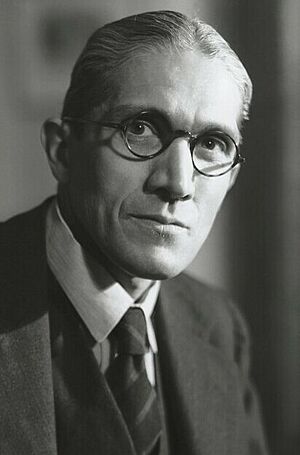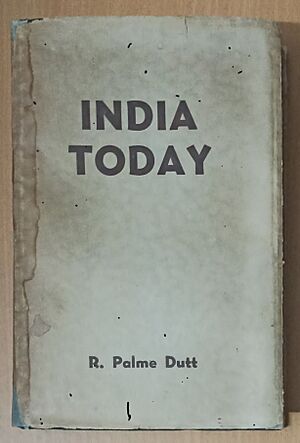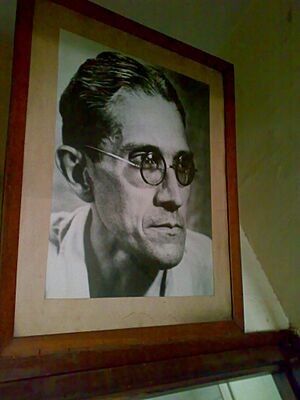R. Palme Dutt facts for kids
Quick facts for kids
R. Palme Dutt
|
|
|---|---|

Palme Dutt, 1943.
|
|
| 4th General Secretary of the Communist Party of Great Britain | |
| In office October 1939 – June 1941 |
|
| Preceded by | Harry Pollitt |
| Succeeded by | Harry Pollitt |
| Personal details | |
| Born |
Rajani Palme Dutt
19 June 1896 Cambridge, Cambridgeshire, England |
| Died | 20 December 1974 (aged 78) Highgate, London |
| Political party | Communist (CPGB) |
| Spouse | |
| Parents |
|
| Relatives | Olof Palme (first-cousin, once removed) |
| Education | The Perse School |
| Alma mater | Balliol College, Oxford |
| Occupation | Editor of Workers' Weekly |
Rajani Palme Dutt (born June 19, 1896 – died December 20, 1974), often known as R. Palme Dutt, was an important writer and thinker for the Communist Party of Great Britain. He was a journalist and a theorist, meaning he developed ideas and theories for the party. He also briefly served as the party's leader, called the General Secretary, during World War II from October 1939 to June 1941. His famous book, India Today, was very important for how people studied Indian history from a Marxist point of view.
Early Life and Education
Rajani Palme Dutt was born in 1896 in Cambridge, England. His father, Dr. Upendra Dutt, was a surgeon from India. His mother, Anna Palme, was from Sweden. Anna Palme was also a great-aunt to Olof Palme, who later became the Prime Minister of Sweden. Rajani had an older brother, Clemens Palme Dutt, and a sister, Elna Palme Dutt. Both Rajani and Clemens helped start the Communist Party of Great Britain.
Dutt went to The Perse School in Cambridge and then to Balliol College, Oxford at University of Oxford. He studied Classics and earned a top degree. However, he was suspended from Oxford for a while. This happened because he was a conscientious objector during World War I. This means he refused to fight in the war because of his beliefs. His writings during this time were seen as against the government.
In 1922, Dutt married Salme Murrik, who was from Estonia. She came to Great Britain in 1920 as a representative for the Communist International, an organization that worked to spread communism worldwide.
Political Journey
Dutt first became involved with the Socialist Movement in England when he was still in school, before World War I began. He was asked to leave Oxford University in October 1917 because he helped organize a meeting for socialists.
In 1919, he started working full-time for the British Labour Movement. He joined the Labour Research Department, which was a group that studied facts and figures from a left-wing perspective. In 1920, he helped create the Communist Party of Great Britain (CPGB) along with Harry Pollitt.
In 1921, Dutt started a monthly magazine called Labour Monthly. He was the editor of this magazine until he passed away. In 1922, he also became the editor of the party's weekly newspaper, the Workers' Weekly.
Dutt was a member of the CPGB's main committee from 1923 to 1965. For many years, he was the party's main theorist, meaning he developed many of the party's ideas and policies.
He first visited the Soviet Union in 1923. There, he took part in discussions about the British communist movement. He was also chosen to be a substitute member of the Presidium of the Executive Committee of the Communist International (ECCI) in 1924.
After getting sick in 1925, Dutt had to step down as editor of Workers' Weekly. He then spent several years in Belgium and Sweden. During this time, he represented the Comintern and also helped guide the Communist Party of India.
Leadership and Views
Palme Dutt was very loyal to the Soviet Union and to the ideas of Joseph Stalin. In 1939, when the CPGB's leader, Harry Pollitt, supported the United Kingdom joining World War II, Palme Dutt disagreed. He followed Stalin's view, which led to Pollitt temporarily leaving his position. As a result, Dutt became the party's General Secretary. He held this role until 1941, when Pollitt returned. This happened after Operation Barbarossa, the German invasion of the Soviet Union, changed the party's mind about the war.
Dutt wrote a book called Fascism and Social Revolution. In this book, he strongly criticized fascism, which is a type of government that is very controlling and nationalistic. He described fascism as a violent, authoritarian, and irrational idea.
After Stalin died, Nikita Khrushchev gave a "Secret Speech" criticizing Stalin. Palme Dutt did not think this speech was very important. He believed that even great leaders like Stalin could have some flaws. He was considered a "hardliner" in the party, meaning he stuck to traditional communist views. He disagreed when the party criticized the Prague Spring, which was when the Soviet Union invaded Czechoslovakia in 1968. He also opposed the party's move towards a more Eurocommunist approach in the 1970s.
He retired from his party roles but remained a member until his death in 1974.
Visit to India
R. Palme Dutt had Indian family roots from his father's side. In 1946, the British Indian Government allowed him to visit India for the first time since 1921. He went to India as a special reporter for the Daily Worker newspaper.
During his four-month visit, he spoke at many rallies in different Indian cities. These rallies were organized by the Communist Party of India. He also met with many members and senior leaders of the Communist Party, including PC Joshi. He also met important Indian leaders like Mahatma Gandhi, Jawaharlal Nehru, Vallabhbhai Patel, Mohammad Ali Jinnah, and Stafford Cripps. The newly created All India Radio even invited him to give a broadcast.
His visit had a big impact on Indian Communists. When they built the headquarters for their publishing house, "People’s Publishing House (PPH)", in Delhi between 1956 and 1958, they named the building "R. Palme Dutt Bhawan" in his honor. A portrait of R. Palme Dutt from 1946 used to hang on the second-floor stairs of this building.
Writings
R. Palme Dutt wrote many books and pamphlets throughout his life, sharing his ideas and analysis. Here are some of his notable works:
- 1920: The Sabotage of Europe
- 1923: The British Empire
- 1931: India
- 1934: Fascism and Social Revolution
- 1939: Why this War?
- 1940: India Today
- 1953: Stalin and the Future
- 1955: India Today and Tomorrow
- 1964: The Internationale



